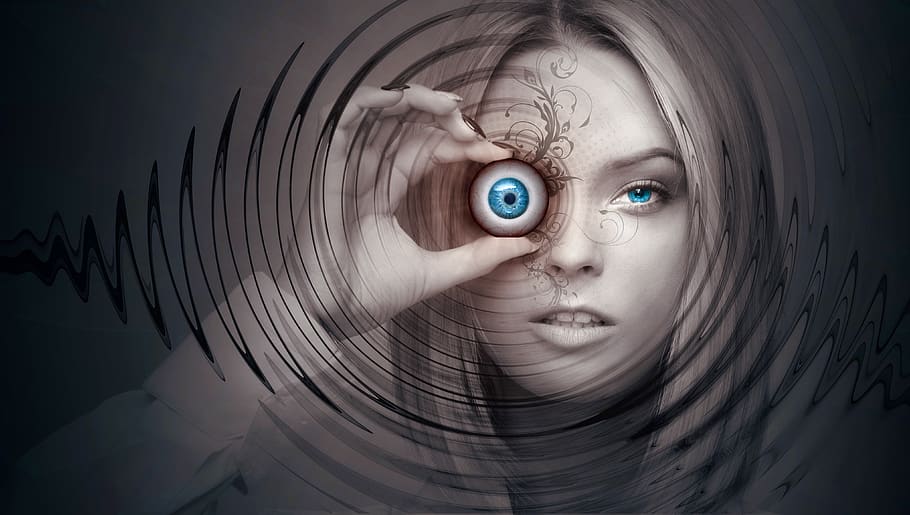There’s no sense of wonder in a game – the moment we plug into a game is also the moment we turn our backs on the wonder and mystery (cliched though this might sound) that there is in the world. Instead, we have something else – we have what might be called the analogue of wonder and mystery, which is ‘gain versus loss’. There’s no mystery in gain or loss and there’s no wonder in it either! The game of gain versus loss (or win versus lose) is utterly banal and it can never be anything but banal. There’s nothing interesting in it, only the anticipation (either agreeable or disagreeable, euphoric or dysphoric) that comes with the anticipation of an outcome which isn’t actually real.
This is an odd thing to consider because we normally regard games in a favourable way. Sport – for example – is generally held in the highest possible regard. Competitive activity, of whatever type, is flat-out glorified by our culture. The whole of society is nothing other than one big game – a game that contains many little ‘sub-games’ (or sub-programmes) and society is a game that is held in very high regard indeed! The social game (or consensus reality) is in fact a game that we take to be the same thing as reality itself. It’s the analogue of reality, as we have just said…
What this means is that we very rarely meet anyone who is not playing a game – we very rarely meet anyone who is ‘for real’ rather than ‘just pretending’. When we take into account the fact that most of the games we play (most of the roles we take on) aren’t actually recognised as games in the first place then this means that the odds against meeting anyone who isn’t immersed in what Timothy Leary calls ‘game reality’ is virtually nil (with the exception of small children, that is, who have not yet been inducted into game reality).
It might sound wrong to say this because we normally see young children is being inherently playful, whilst adults – as everyone knows – are much more inclined to be serious (or ‘non-playful’). The point is however that adult play is entirely unconscious, which is to say, we’re playing a game that we are aren’t aware to be only a game. We actually think it’s very important! We need only to look at the faces of adults who are playing games that they don’t know to be games to see this. When we are playing a game but have forgotten that we are then things get very serious about indeed – we often get downright nasty about it. We lose our sense of humour entirely in our rational gameplaying, we become just like machines.
We’re all locked into games that we take extremely seriously and what this means is that we are being controlled by our goals (or by our agendas) without knowing it. Our goals have become super-important to us when actually they’re only important because we’ve unwittingly agreed for them to be. We can’t let go of our goals and we will feel terrible if we can’t attain them; we aren’t just disappointed in the fact that we have failed, we lose our respect for ourselves. We will hold ourselves in low esteem because we haven’t managed to do whatever it is we’re supposed to have done; we will blame ourselves and think bad things about ourselves and this clearly shows that we’re being controlled by our goals, that we’re being defined by our goals, rather than it being the other way around (as we would like to imagine).
I say that the goal is mine, that I myself have made it, which is a complete inversion of the true state of affairs; the goal doesn’t serve me but rather I serve it. If I really was ‘the boss’ then I would be able to drop my goal any time I want and not feel in the least bit guilty about doing so but experience shows – time and time again – that this is not the case. If I want to feel good about myself and my place in the world then I have to perform correctly, I have to jump through the hoops that thought has put in place, I have to meet the required standard. Otherwise my position is lowly in the extreme – it’s as if I don’t deserve to exist unless I can please my So although I might say that I am pursuing the goal because it suits me to do so, because I myself genuinely want to – which would mean that I am the boss – what is happened in reality is that I have given away my freedom to the goal (or to the game) and this isn’t the same thing at all.
This is why we are so serious, why we’re so stressed out and humourless – because we’re slaves and all we care about is not being punished by our own mechanical minds. There’s no sense of humour, no sense of irony in this artificial situation precisely because there’s no freedom in it – there is only the grim need to succeed (which is the same thing as the grim need to avoid failure). There is humour in life, just as there is wonder and mystery, whereas in a game – as we started out by saying – there is absolutely nothing of the kind. Humour there is none, wonder and mystery there is none, poetry there is none, and what we have instead is mere brutal compulsion. In this trapped and humourless situation we are not in the least bit interested in the world as it is in itself, we’re only interested in what we have made of it, we’re only interested in fulfilling our narrow agenda.
We are trapped in our games because we’re operating on the basis of fear, and when we’re operating on such a basis, this – needless to say – isn’t ever going to be a very humorous situation. In order for humour to come into the picture there has to be space, there has to be a plurality of viewpoints so that no one VP can get ‘above itself’ and thereby lay claim to an importance that it does have. An equivalent statement to this would be to say that when there is no plurality of viewpoints then the idea we construct of ourselves that we end up with can’t be questioned, can’t be ‘taken with a pinch of salt’; the essential thing about mental health – as is often said – is the ability to ‘laugh at ourselves’ and this requires perspective. In the absence of perspective, it is inevitable that we take seriously what was never meant to be taken seriously (so to speak).
There is a conflict of interests going on here therefore – on the one hand we want security, which means that need to have just the one way of looking at things (since otherwise what we’re trying to hold onto will be revealed as non-substantial), and on the other hand we want to have ‘mental health’ because without it life is reduced to nothing more than a grim and pointless rigmarole (which is what it always becomes when we live on the basis of our thoughts). Life doesn’t hold any poetry, any playful nuances of meaning, when we’re operating on the basis of thought – the only meaning allowed here is the ‘meaning of the game’, which is exactly like some sort of humourless state ideology that we are obliged (out of fear) to go along with. In a nutshell, we are exchanging life for the pseudo-life of ‘playing the game’ and playing the game only contains two possibilities – ‘succeed’ or ‘fail’. There’s nothing else that counts. The one thing the system isn’t going to do therefore is cut us any slack. Only ‘the strong’ will be rewarded, we say.
When we’re in the state of fear then one thing we care about is escaping from it (obviously enough) and the way we do this is by immersing ourselves in ‘the mind’s version of reality’ where everything has already been defined; there is still the possibility of ‘the bad thing happening’ here but this way we at least know what ‘the bad thing is’. The bad thing is defined! We know what the unwanted outcome is and – in addition – we have a legitimate chance of avoiding it by following the rules. As well as the threat of ‘getting it wrong’, we could say that there is also the lure of ‘getting it right’; the System of Thought provides us with a solution to our problems, in other words, and this is what hooks us in. What we’re essentially afraid of is the undefined situation (or ‘not knowing what stuff is or ‘what exactly we should do about it’ and this way we sidestep all of that. We know what we want and we know what we don’t want and we also know that there is a logical (or rule-based) way to work this, which gives us something we can cling to…
The Defined World doesn’t exist however – the whole thing is one big escape! When we’re in Fleeing Mode (or Conservative Mode) then all we’re really interested in is shutting down space; we will say that we’re interested in all these other things, and that we have all these different values, but all of these values come down to shutting down space. All the goals that we preoccupy ourselves with in our lives come down to this one – unacknowledged – goal. We associated with like-minded folk, folk who share our ‘values’, and we have no time at all for those who don’t. And if people don’t subscribe to our so-called ‘value-system’ then we demonize them, we see them as being unaccountably aberrant, as being a menace to our way of life, and so we will either ignore them or actively persecute them, depending upon what we feel we can get away with. There are perhaps no heresy trials in the 21st century but there is the modern equivalent – there is still the in-crowd versus the out-crowd and people are still punished for not beyond loyal to the consensus viewpoint, despite our talk of ‘inclusivity’. Ironically, those who go on most about inclusivity tend, as we know, to be the most vicious of all in the judgmentalism that they direct towards those who don’t agree with them.
‘Shutting down space’ is the collective endeavour that we’re all engaged in, this is what we’re all so gung-ho about, but – despite all the hype – it’s a road that goes nowhere. ‘Space’ just happens to be another way of talking about reality so straightaway we can see that this is not a good thing to get all fired up about. Shutting down space involves us in an infinite regress because not only do we have to ‘shut down space’ we also have to shut down any awareness of our ongoing efforts move in this direction (along with all the unpleasant consequences that it brings in its wake). We’re involved in an infinite regress since not only do we have to run away from reality we also have to run away from our running away; our ‘running away’ from reality is part of reality and seeing it will unfailingly remind us of reality that we wish to escape from. The fact that what we’re trying to do adversely effects our mental health (and how can it not?) means that – collectively – we simply can’t afford to take a genuine interest in this area and so what we do to cover up our profound lack of interest in getting to the truth of the matter is to invest a bogus system of psychology, a system of psychology that leads us even further in the ‘wrong direction’…
Because we have given away our freedom to the goal (or to the system, or to the game, or however else we want to put it) we are obliged to keep on playing the game of ‘trying to achieve the goal’ even though that can never happen (and even though it is producing lots of unwanted consequences). As we’ve just said, not only are we under pressure to keep on playing the game as best we can, we’re also under pressure to keep on being ridiculously enthusiastic about it. It’s important to ‘stay positive’, as we say – this is our moral duty and great shame will attach to us if we fail in that duty. This is how fear traps us (or rather causes us to trap ourselves) – it’s not just that we’re too afraid to let ourselves see that the game is only a game, we’re also prevented by fear from admitting that what the game is implicitly promising us is never delivered. We are obliged to keep on keep on believing in the existence of ‘the solution’ because without it nothing makes sense. Without this key belief the sham is exposed.
Because escaping from reality isn’t itself ‘a real thing’, our only option is to pretend to ourselves that it is, and then believe our own pretence. We can’t really escape from reality, but we can certainly play the game that we can. This means that we invert the whole picture – that’s what ‘playing a game’ means it means turning everything upside down so that the motivation of wanting to flee from reality is represented as striving to do the honourable thing, the socially sanctioned thing. We see ourselves as striving to win, striving to accomplish, striving to attain. ‘Striving to accomplish’ already sounds very good – all we have to do is to refrain from mentioning what exactly it is that we’re trying to accomplish. We can happily gloss over that part – where’s the need to get all philosophical about it, after all? There is a goal and attaining goals – by definition – is a great and praiseworthy thing! As long as we take a narrow enough view of things we can glorify any sort of striving therefore; as long as we don’t ever ‘look outside the box’ we can see any sort of trying as being splendidly aspirational. We’re not trying to escape from reality (like a bunch of self-deceiving cowards who lack even the tiniest smidgeon of integrity), we’re trying to achieve some sort of objective external value.
Games present everything backwards, therefore – the whole time we imagine that we’re ‘struggling to achieve this, that and the other’ we’re actually hiding out from the truth. We’re caught up in a Which is now achievement this is the Reversed World of samsara, we might say; this is the ‘upside-down world’ in which all values are turned on their heads. Instead of curiosity there is greed and nosiness, instead of wonder there is the never-ending oscillation between pleasure and pain, hope and fear, satiation and need. We ‘live to succeed’ (because ‘succeeding’ solves all problems, because ‘failure is not an option’) but the moment we do succeed (or rather the moment we think that we do) we have to start it all over again precisely because our so-called ‘succeeding’ is merely an idea, not a real thing. We’re trying to prove a point that can’t be proved and so we have no choice but to keep on doing it, as if mere mechanical repetition will eventually (by some miracle) ‘do the job ‘for us…
What we’re actually doing with our interminable game playing is that we’re distracting ourselves from the wonder that is all around us. We’re very much invested in ‘shutting down the wonder’ only we don’t – of course – see it like this. That’s not how we understand what’s going on; that’s not how we understand things because in the Reversed World wonder isn’t wonder but FEAR – fear of the radically new, fear of anything that doesn’t fit in with our narrow scheme of things, fear of anything that challenges the dreadfully superficial idea that we have of ourselves. We’re simply not in the market for wonder therefore – wonder is ‘opening the door that we are absolutely determined to keep shut’. It’s because we are – as adults – all busy ‘playing the distraction game’ that a sense of wonder doesn’t figure in our lives very much. The world of distractions doesn’t provide us with wonder of course – that’s not what it’s for. The Distraction World is there to protect us from wonder, not ‘open the door’ to it…
Image – World of Final Fantasy, taken from killscreen.com






